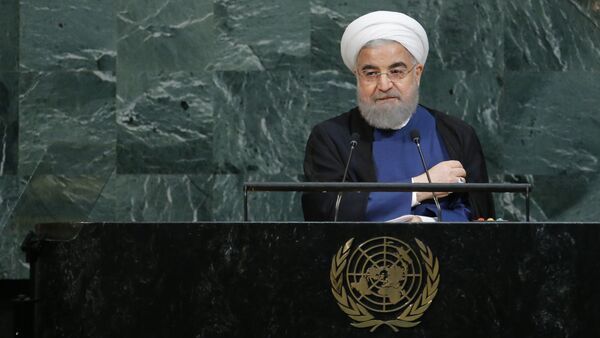MOSCOW (Sputnik) — The possible abandoning by US President Donald Trump of a nuclear deal with Iran will not affect Russia's implementation of the program of arms deliveries to Tehran from 2020, in particular, combat planes and helicopters, warships and missile systems, ex-chief of the Russian upper house's defense and security committee, Viktor Ozerov told Sputnik on Friday.
Earlier on Thursday, the Washington Post newspaper reported that US President Donald Trump intended to "de-certify" the nuclear deal with Iran next week. According to the newspaper, Trump is expected to deliver a speech on October 12, when he will open the door to modifying the agreement as part of a tougher approach toward Iran. Under the terms of the current nuclear agreement, Trump has until October 15 to certify Iran's compliance.
"There is a UN Security Council decision confirming Tehran's fulfillment of all its obligations under the nuclear program. Russia will fulfill all its obligations to Iran, including the program of arms deliveries from 2020, they have not been withdrawn," Ozerov said.
Ozerov specified that in 2020 the UN embargo on conventional arms export to Iran would be lifted. From that point on, Iran will be able to legally procure tanks, armored combat vehicles, large-caliber artillery systems, combat jets and helicopters, military ships and missile systems from foreign partners.
The United Nations imposed the arms embargo on Iran in several steps. In 2006, the organization banned all exports of technology that could be used for developing nuclear weapon delivery systems to Iran. In 2007, the UN Security Council also outlawed arms export from Iran. Finally, in June 2010, the United Nations put an embargo on all major conventional arms exports to the Islamic Republic. The latest restrictions are expected to be lifted five years after the day the JCPOA was adopted, or in October 2020.
The possible US withdrawal may affect the prospects for Syrian settlement taking into account the role of Tehran in this process Ozerov added.
"Taking into account Iran's position on Syria, Washington's withdrawal may affect Syrian settlement, which is carried out with the participation of Tehran as well," Ozerov said.
He also underlined that Washington's possible withdrawal from the nuclear deal with Iran may prompt concerns in Moscow.
"If Washington withdraws from the nuclear deal with Iran, Russia may get concerned that a similar thing will happen to the Intermediate-Range Nuclear Forces Treaty, which has been repeatedly mentioned by the United States," Ozerov said.
The lawmaker added that Washington's possible pullout of the deal might come across as "a very negative signal" for Pyongyang, as North Korea will see that even if it makes a step forward and phases out its nuclear program, the United States can nevertheless impose news sanctions on the country.
Previously, the Russian State Duma's International Affairs Committee Chairman claimed that a possible US withdrawal from the nuclear deal with Iran may lead to possible "outbreaks" from Tehran.
The Joint Comprehensive Plan of Action, also known as the Iran nuclear deal, is an international agreement providing for the gradual lifting of economic and diplomatic sanctions imposed on Iran by Western countries in exchange for closing Tehran's nuclear program. The agreement was concluded between Iran and the P5+1 countries (China, France, Russia, the United Kingdom, United States plus Germany) in 2015 after years of diplomatic work and came into force in January 2016.
Earlier, Trump said in his speech to the UN General Assembly that the deal was "an embarrassment" to the United States.




